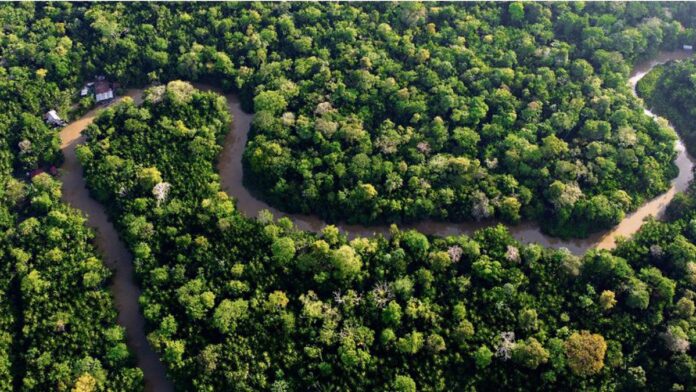Belem: In a landmark collaboration, Brazil and France have embarked on a groundbreaking investment program aimed at protecting the Brazilian and Guyanese Amazon rainforests. The initiative, involving 1 billion euros ($1.1 billion) in public and private funds over the next four years, was announced amidst French President Emmanuel Macron’s visit to Brazil.
Touching down in Belem, near the Amazon’s mouth, Macron was warmly received by Brazilian President Luiz Inacio Lula da Silva. Against the backdrop of this significant meeting, the two leaders issued a joint statement reaffirming their commitment to combating deforestation and climate change.
“Gathered in Belem, in the heart of the Amazon, we, Brazil and France, Amazonian countries, have decided to join forces to promote an international roadmap for protection of tropical forests,” the statement declared.
Central to their pledge is the goal to halt deforestation in the Amazon by 2030, aligning with global efforts to mitigate climate change. This commitment gains added significance as Brazil prepares to host the COP30 climate negotiations talks in Belen in 2025.
Macron and Lula outlined an ambitious agenda that includes the conservation, restoration, and sustainable management of tropical forests worldwide. Notably, they agreed to explore innovative financial mechanisms and market incentives to support environmental stewardship.
During Macron’s visit, the leaders embarked on a symbolic river boat journey to witness sustainable development projects firsthand, including a chocolate production initiative on a nearby island. They also engaged with Indigenous leaders, with Macron bestowing the National Order of the Legion of Honor upon Chief Raoni Metuktire in recognition of his tireless advocacy for rainforest protection and Indigenous rights.
Chief Raoni seized the opportunity to express concerns over the environmental impact of a proposed railway project, urging President Lula to prioritize Indigenous consultation and environmental preservation.
While past tensions between France and Brazil over environmental issues have been evident, particularly during the fires crisis in 2019, recent developments signal a thaw in relations. French officials underscored their commitment to revitalizing bilateral ties and strategic cooperation with Brazil, marking a new chapter in their diplomatic engagement.
As Brazil and France forge ahead with their collaborative efforts, the world watches closely, hopeful for meaningful progress in safeguarding one of Earth’s most precious ecosystems.
Saving the Amazon rainforest requires a multifaceted approach that addresses both immediate threats and underlying causes of deforestation. Here’s a comprehensive plan:
- Conservation Initiatives: Implement and expand protected areas, national parks, and indigenous territories to safeguard critical ecosystems and biodiversity hotspots within the Amazon.
- Law Enforcement: Strengthen enforcement of environmental laws and regulations to combat illegal logging, mining, and land clearing activities. This includes increasing patrols, utilizing technology for monitoring, and imposing strict penalties for offenders.
- Sustainable Land Use: Promote sustainable land management practices, such as agroforestry, sustainable agriculture, and reduced-impact logging, to minimize deforestation while supporting local livelihoods.
- Indigenous Rights: Respect and empower Indigenous communities who are traditional stewards of the land. Recognize and uphold their land rights, and involve them in decision-making processes regarding land use and conservation efforts.
- International Collaboration: Foster cooperation among Amazonian countries and international partners to coordinate conservation efforts, share best practices, and mobilize financial resources for forest protection.
- Economic Incentives: Provide financial incentives for forest conservation through mechanisms such as payments for ecosystem services (PES), carbon credits, and sustainable tourism initiatives.
- Consumer Awareness: Raise awareness among consumers about the environmental and social impacts of products sourced from the Amazon, such as beef, soy, and palm oil. Encourage sustainable consumption choices and support companies that prioritize responsible sourcing.
- Research and Monitoring: Invest in scientific research and monitoring programs to better understand the ecological dynamics of the Amazon and track changes in forest cover, biodiversity, and ecosystem health over time.
- Climate Action: Recognize the role of the Amazon rainforest in regulating the global climate system and prioritize efforts to reduce greenhouse gas emissions and mitigate climate change on both local and global scales.
- Political Will: Advocate for strong political leadership and public policies that prioritize environmental conservation and sustainable development in the Amazon region. Hold governments and corporations accountable for their actions and commitments to protect the rainforest.



